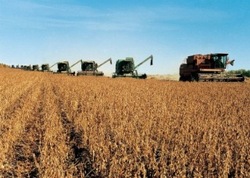
If the deal goes ahead, Beidahuang would own land and produce grain and other foods in Australia for export to China, through co-investment in local grain handling infrastructure.
China prowls WA farmland
BY COLIN BETTLES
CHINA’S most powerful agricultural company, with more than 900,000 employees and connections to State owned banking enterprises, is looking to acquire about 80,000 hectares of WA farmland, with several farmers understood to be on the verge of signing.
But the move is intensifying pressure on the Federal government to quantify foreign ownership in Australian agriculture and develop more appropriate regulations that match a long-term, sustainable national food plan.
In pursuing a concerted global strategy driven by future food security concerns, senior representatives from China’s Beidahuang Group (BDH Group) visited WA last month to develop discussions on potential land purchases and other related acquisitions.
If the deal went ahead, the company would own land and produce grain and other foods in Australia for export to China, through co-investment in local grain handling infrastructure.
In March this year, the BDH Group’s chairman, Sui Fegfu, was reported as saying the company planned to acquire 200,000 hectares of farmland this year, in Australia and Russia, the Philippines, Brazil, Argentina, Zimbabwe and Venezuela.
It’s understood the State-owned company’s investment in overseas projects between 2005 and 2010 totalled more than 250 million Yuan (AUD$37.6 million).
But while the company wants to buy Australian farm-land, different strategies are being pursued in other countries, such as the provision of machinery and labour in Venezuela and Zimbabwe for about 20 percent harvest return.
In Brazil and Argentina the business model would see rented land used for food production.
As part of its WA strategy, the company could produce about 200,000 to 250,000 tonnes of grain and potentially by-pass CBH’s bulk grain handling system en-route to China.
The possible joint venture would also handle additional grain volumes through port facilities, potentially benefitting other farmers within the region, through lower grain handling costs.
The presence of such an entity in the local market would also pressure farmer-owned co-operative CBH to sharpen its pencil, through increased competition.
The delegation also included representatives from the Export-Import Bank of China with links to the Chinese Development Bank and has visited a number of southern farmers, on several recent trips.
They are now understood to be considering or close to signing generous offers by the Group to purchase land, with some reportedly offered hundreds of dollars per hectare more than current southern farm-land values, due to strategic needs.
A confidential source with intimate knowledge of the deal said the Chinese company’s moves to buy the WA farm land for food production posed more of a challenge to CBH, than national food security in Australia.
“Why is CBH scared of competition if it brings greater price transparency and competition; it’s OK to make inquiries,” the source said.
According to the company’s web site, it has 50 billion Yuan (AUS$7.5 billion) in total assets while the total land area of its 113 State owned farms covers 5.43 million hectares; including 2.124 million hectares of cultivated land, with about 66,000 hectares certified for organic production.
Lake Grace farmer and former WAFarmers grains committee president, Doug Clarke, has been providing local advice for the Chinese group and says their investment interest in Australian agriculture is positive for land values.
He said the Chinese investors had met with a range of farmers but he had no detail on the precise volume of land they wanted to acquire in Australia or volume of money being spent.
“I don’t see it as a threat at all; farmers are entitled to sell their land if they want to and it’s just another option,” he said.
“We had our worst year in 100 years last year so if there’s another buyer in the market, putting a floor in the market, that’s just like selling our wheat and can only be a good thing.
“It’s not in breach of foreign investment rules so what’s the drama?”
Mr Clarke said the Chinese government and agricultural companies should not be knocked for taking a positive attitude towards agricultural development and pursuing a vision for feeding its people amid food security concerns.
But meanwhile in Australia, “we lurch from one election to the next”.
It’s understood the Chinese investors have also met with WA State government officials who have said they would continue to monitor progress.
While some farmers are understood to have signed deals, final approval will be required by government regulators and other complexities may arise with the Chinese yet to establish a local entity to operate under legally in Australia.
Last week, WAFarmers raised concerns about the delegation’s inquiries into purchasing farmland in the Albany port zone.
WAFarmers President, Mike Norton, said “this level” of sovereign ownership of Australian farmland had the potential to have serious impacts on rural communities and the Australian economy.
Mr Norton said if significant amounts of farmland are amalgamated “under one ownership”, it had the potential for local communities to suffer as the population falls and local businesses and support services such as local fire brigades and ambulances shut down.













